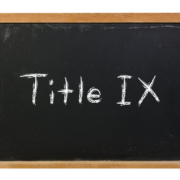Objective Evaluation of Evidence in Title IX Grievance Procedures: What’s New in 2024
The 2024 Title IX Final Rule brings significant updates to how evidence is handled in Title IX grievance procedures. A key aspect of these updates is the objective evaluation of all relevant evidence, and according to the Department of Education, is designed to ensure fairness, reduce litigation risk, and align with established case law. Here’s what you need to know about these changes and how they may impact the parties involved in a Title IX grievance procedure.
Clear Guideposts for Evidence Evaluation
Under the new regulations, all evidence that may aid a decision-maker in determining whether the alleged sex discrimination occurred must be objectively evaluated. This includes both inculpatory and exculpatory evidence, which the Department believes helps protect due process and ensures that all relevant information is considered fairly.
Defining “Relevant” Evidence
“Evidence is ‘relevant’ when it may aid a decision maker in determining whether the alleged sex discrimination occurred.” This definition clarifies that only evidence which could help in reaching a decision on the alleged discrimination should be considered. The Department of Education has stressed the importance of this clarity, ensuring that the evidence review process in grievance procedures is both reliable and impartial.
Exclusion of Impermissible Evidence
Despite the broad scope for relevance, there are strict prohibitions on certain types of evidence. The updated regulations exclude impermissible evidence regardless of its relevance. There are three main categories that the Department says must be excluded in an investigation, and they happen to be substantially the same as the 2020 regulations. They are
- Evidence that is protected under a privilege as recognized by Federal or State law
- A party’s or witness’s records that are made or maintained by a physician, psychologist, or other recognized professional or paraprofessional in connection with the provision or treatment to the party or witness (this can be waived), or
- Evidence that relates to the Complainant’s sexual interests or prior sexual conduct, unless it is
A. Offered to prove that someone other than the Respondent committed the alleged conduct; OR
B. Is evidence about specific incidents of the Complainant’s prior sexual conduct with the Respondent that is offered to prove consent to the alleged sex-based harassment.
Opportunity for Contesting Relevance Determinations
Parties involved in a grievance procedure have the opportunity to respond to the evidence collected, including raising concerns about the relevance determinations. This provision ensures that all parties can contribute to a transparent evaluation process and contest decisions about what evidence is considered during the grievance procedures.
Training and Fairness
The final rule also requires that all investigators, decision-makers, and any personnel involved in implementing grievance procedures receive training on what constitutes relevant evidence. The Department believes this training is crucial for maintaining the standards of fairness and impartiality outlined in the regulations.
Impact on Colleges and Universities
Unlike some of the other changes, these changes here are less likely to have a significant impact on how Auburn University and other colleges and universities handle Title IX cases. Much of this remains the same from the 2020 regulations, with the exception of a clearly defined definition for relevance.
Conclusion
The 2024 updates to Title IX grievance procedures represent a substantial changes regarding the handling of sex discrimination cases at Auburn University and other educational settings. For students, parents, and educators, understanding these changes is crucial to navigating the grievance process effectively. If you are involved in a Title IX case or need guidance on these new regulations, reaching out for informed advice can help ensure that your rights and interests are fully protected.












Leave a Reply
Want to join the discussion?Feel free to contribute!